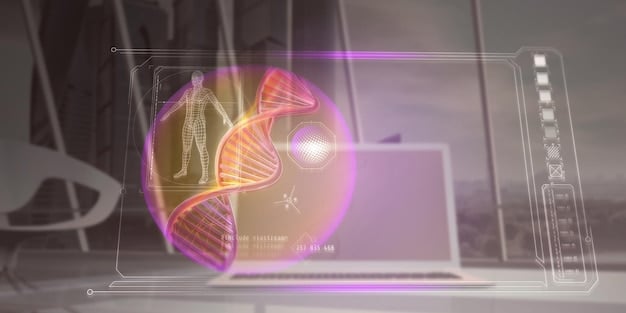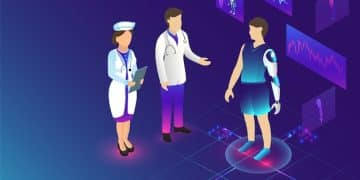Latest NLP Advances in US Healthcare: Revolutionizing Patient Care

The latest advances in Natural Language Processing (NLP) for healthcare applications in the US are revolutionizing patient care through improved diagnostics, personalized treatment plans, enhanced data analysis, and streamlined administrative processes, ultimately leading to better patient outcomes and more efficient healthcare systems.
Natural Language Processing (NLP) is rapidly transforming the healthcare landscape in the US. Explore the latest advances in Natural Language Processing (NLP) for healthcare applications in the US, and witness how these advancements are shaping the future of medicine.
Natural Language Processing in Healthcare: An Overview
Natural Language Processing (NLP) has emerged as a transformative force in various sectors, and healthcare is no exception. NLP’s ability to process and understand human language offers immense potential for improving patient care, streamlining operations, and accelerating research. In the US, healthcare providers and researchers are increasingly leveraging NLP to extract valuable insights from unstructured data, automate tasks, and enhance decision-making.
The integration of NLP into healthcare is driven by the vast amounts of textual data generated daily, including electronic health records (EHRs), clinical notes, research publications, and patient feedback. Traditionally, this data has been challenging to analyze efficiently. However, with NLP, healthcare professionals can unlock the hidden knowledge within these texts, leading to more informed decisions and better patient outcomes. Let’s delve into the exciting advancements in this field.

Advancements in Clinical Documentation and Data Extraction
One of the most significant areas where NLP is making strides in healthcare is in clinical documentation and data extraction. Physicians and nurses spend considerable time documenting patient encounters, procedures, and observations. NLP technologies are helping to automate and streamline these processes, reducing administrative burdens and allowing healthcare providers to focus more on direct patient care.
Automated Clinical Note Summarization
NLP-powered tools now can automatically summarize lengthy clinical notes. By identifying key information such as diagnoses, treatments, and patient history, these tools provide clinicians with concise overviews of patient cases, enabling faster and more informed decision-making. This reduces the time required to review each patient’s records and improves the efficiency of daily healthcare operations.
Enhanced Information Retrieval
NLP algorithms are enhancing the efficiency of information retrieval within EHR systems. Healthcare professionals can quickly find relevant medical literature, patient data, and treatment guidelines using natural language queries. This capability is crucial for evidence-based practice and continuous learning. The improved search functionality saves time and ensures that providers have access to the most up-to-date information when caring for patients.
- Improved Accuracy: NLP algorithms are designed to minimize errors in data extraction, providing accurate insights for clinical decision-making.
- Time Savings: Automated documentation and summarization save significant time for healthcare providers, reducing administrative overhead.
- Better Patient Care: Efficient data access and accurate summaries contribute to more informed and timely patient care.
- Data-Driven Insights: NLP extracts meaningful insights from unstructured data, fostering a data-driven approach to healthcare.
In conclusion, advancements in clinical documentation and data extraction through NLP are revolutionizing how healthcare professionals manage and utilize patient information. These tools not only streamline workflows but also enhance the quality of care by providing quick access to accurate, relevant data.
NLP for Improved Diagnostics and Predictive Analysis
NLP is not only assisting with data extraction but also playing a crucial role in improving diagnostics and enabling predictive analysis in healthcare. By analyzing textual data from various sources, NLP algorithms can identify patterns and predict potential health risks, allowing for early intervention and personalized treatment plans.
Early Disease Detection
NLP algorithms can analyze clinical notes, patient histories, and other textual data to identify subtle indicators of diseases such as cancer, Alzheimer’s, and mental health conditions. Early detection can significantly improve treatment outcomes and reduce healthcare costs. This proactive approach allows healthcare providers to intervene earlier and provide more effective care.
Predictive Modeling and Risk Assessment
NLP is used to build predictive models that assess patient risk for various health conditions. By identifying risk factors and predicting potential adverse events, healthcare providers can implement preventive measures and tailor treatment plans more effectively. These models are designed to improve patient outcomes and reduce healthcare costs by preventing avoidable complications.

- Enhanced Accuracy: NLP-driven diagnostic tools offer improved accuracy in identifying diseases and predicting health risks.
- Personalized Treatment: Predictive analysis allows for personalized treatment plans tailored to individual patient needs.
- Reduced Healthcare Costs: Early detection and preventive measures can lead to significant cost savings in healthcare.
- Improved Patient Outcomes: Proactive interventions and targeted treatments result in better health outcomes for patients.
In summary, NLP’s role in enhancing diagnostics and predictive analysis is transformative. These advancements enable healthcare providers to detect diseases early, predict risks accurately, and personalize treatment plans, ultimately leading to improved patient outcomes and a more efficient healthcare system.
Enhancing Patient Experience with NLP-Powered Chatbots and Virtual Assistants
Patient experience is a critical aspect of healthcare, and NLP is playing a significant role in improving it through chatbots and virtual assistants. These technologies provide patients with instant access to information, support, and personalized care, enhancing their overall healthcare journey.
24/7 Access to Information
NLP-powered chatbots and virtual assistants offer patients 24/7 access to information about their health conditions, medications, and treatment plans. This immediate access reduces patient anxiety and empowers them to make informed decisions about their health. These tools can answer common questions and provide support outside of regular office hours.
Personalized Support and Guidance
These virtual assistants can provide personalized support and guidance to patients, helping them manage chronic conditions, follow treatment plans, and improve their overall well-being. By understanding patient needs and preferences, they offer tailored advice and encouragement, fostering better adherence to medical recommendations. This personalized approach enhances patient engagement and satisfaction.
By leveraging NLP, healthcare organizations can foster a more patient-centric approach, improving satisfaction and building stronger relationships. These tools are increasingly important in today’s digital healthcare landscape.
NLP’s Contribution to Streamlining Administrative Processes
Beyond direct patient care, NLP is also streamlining administrative processes within healthcare organizations, reducing costs and improving efficiency. By automating tasks such as claims processing, coding, and compliance monitoring, NLP technologies are freeing up administrative staff to focus on more strategic initiatives.
Automated Claims Processing
NLP algorithms can automatically process insurance claims by extracting relevant information from medical records and verifying billing codes. This automation reduces errors, speeds up processing times, and lowers administrative costs. The ability to quickly and accurately process claims is essential for maintaining financial stability in healthcare organizations.
Efficient Coding and Billing
NLP is used to automate the coding and billing processes by accurately assigning medical codes to diagnoses and procedures. This not only ensures compliance with regulatory requirements but also reduces the risk of coding errors and billing discrepancies. Efficient coding and billing are crucial for optimizing revenue and maintaining regulatory compliance. Organizations save time and resources by leveraging automation.
- Reduced Costs: Automation of administrative tasks leads to significant cost savings for healthcare organizations.
- Improved Efficiency: Streamlined processes enhance operational efficiency and reduce processing times.
- Enhanced Compliance: Automated compliance monitoring ensures adherence to regulatory requirements and reduces the risk of penalties.
- Better Resource Allocation: Freeing up administrative staff allows them to focus on more strategic and value-added activities.
In conclusion, NLP’s contribution to streamlining administrative processes is transforming how healthcare organizations operate. By automating routine tasks and improving efficiency, NLP enables healthcare providers to focus on delivering high-quality patient care while optimizing resource allocation.
Challenges and Future Directions for NLP in US Healthcare
While the advancements in NLP for healthcare are promising, several challenges need to be addressed to fully realize its potential. These challenges include data privacy concerns, algorithmic bias, and the need for increased collaboration between NLP researchers and healthcare professionals. However, ongoing research and development efforts are paving the way for exciting future directions.
Addressing Data Privacy and Security Concerns
Protecting patient data privacy and security is paramount. Healthcare organizations must implement robust data governance policies and use privacy-preserving NLP techniques to ensure compliance with regulations such as HIPAA. Addressing these privacy aspects are the key to establishing trust.
Mitigating Algorithmic Bias
Algorithmic bias can lead to disparities in healthcare outcomes. NLP models must be carefully designed and trained on diverse datasets to ensure fairness and equity. Mitigating bias is crucial for ensuring that NLP benefits all patient populations.
Opportunities for Further Innovation
Further innovation in NLP for healthcare will focus on developing more sophisticated algorithms, integrating NLP with other AI technologies, and expanding its application to new areas such as drug discovery and personalized medicine. These advancements will further transform the healthcare landscape and improve patient outcomes.
NLP Ethics in Healthcare and Patient Confidentiality
Integrating NLP in healthcare inherently involves ethical considerations and patient confidentiality. Striking the right balance between technological advancements and patient rights ensures responsible innovation. NLP algorithms must be trained and applied in a manner that respects privacy laws and regulations.
Maintaining Patient Privacy
Protecting patient data is one of the foremost ethical challenges. NLP models should be designed to minimize the risk of identifying individuals from healthcare records. Privacy-enhancing techniques, such as data anonymization and federated learning, play a crucial role in preserving patient confidentiality.
Ensuring Data Security
Securing healthcare data from unauthorized access is yet another critical ethical consideration. NLP systems need robust security measures to prevent data breaches and protect sensitive patient information. Measures include end-to-end encryption.
- Transparency: Ensuring transparency in NLP algorithms helps in understanding how decisions are made and potential biases.
- Accountability: Establishing accountability for NLP systems ensures there are mechanisms in place to address errors or unintended consequences.
- Fairness: Developing NLP models that are fair and equitable across diverse populations is crucial for preventing health disparities.
- Security: Data security protocols must be in place to protect patient data from unauthorized access.
Successfully navigating these challenges will unlock the full potential of NLP in healthcare, ensuring that technology is used responsibly and ethically to enhance patient care and improve health outcomes.
| Key Point | Brief Description |
|---|---|
| 🩺 Clinical Documentation | NLP automates clinical summaries and improves information retrieval. |
| 🔬 Diagnostics & Analysis | NLP enhances early disease detection and predictive risk assessment. |
| 🗣️ Patient Experience | NLP-powered chatbots offer 24/7 support and personalized guidance. |
| ⚙️ Administrative Efficiency | NLP streamlines claims, coding, and compliance processes. |
Frequently Asked Questions (FAQ)
▼
NLP in healthcare refers to using Natural Language Processing techniques to analyze medical texts, like patient records and clinical notes, to improve processes such as diagnostics, extraction of important data, and delivering personalized patient care.
▼
NLP improves patient care by automating summaries, predictive analytics, and improved efficiency. All contribute to data-driven, fast, and accurate diagnosis allowing healthcare providers to focus more on the patient.
▼
Ethical considerations include preserving patient data privacy and security, avoiding algorithmic bias, and the fairness involved in the creation of diverse and fair datasets.
▼
NLP streamlines healthcare administration by automating claim processing and enhancing compliance monitoring. It also ensures that there is reduced risk of coding errors and any kind of billing discrepancies.
▼
NLP improves clinical documentation through the process of automating clinical note summaries and enhancing information retrieval. By summarizing clinical documentation, NLP is time-efficient and is also beneficial for patient care.
Conclusion
In conclusion, the advancements in NLP for healthcare in the US are revolutionizing many aspects of the industry. From enhancing clinical documentation and diagnostics to improving patient experience and streamlining administrative processes, NLP is paving the way for a more efficient, personalized, and data-driven healthcare system.





